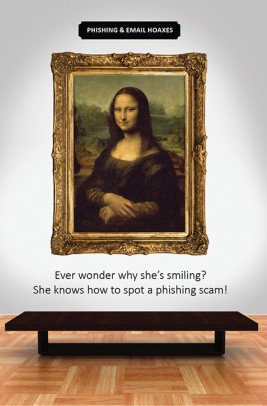Security awareness fights cyber threats
 Have you ever received a Facebook message from someone you didn’t know, asking you to click on a link? Or an email from a friend that didn’t sound like her?
Have you ever received a Facebook message from someone you didn’t know, asking you to click on a link? Or an email from a friend that didn’t sound like her?
Chances are, you received a cyber threat.
The Academic Computing and Communications Center is educating the campus community of these dangers throughout October for National Cyber Security Awareness Month.
“Sometimes you get links sent to you and you click on them, and they will do things to your computer without you knowing that it’s happening,” said Edward Zawacki, ACCC chief information security and privacy officer.
“If you connect the dots, there’s a lot of information out there that could be used as leverage to get into accounts that you might not want people to get into.”
ACCC will host interactive information booths around campus throughout the month:
• Friday, Daley Library concourse
• Oct. 16, Student Center West lobby
• Oct. 21, Student Center East concourse
• Oct. 31, Daley Library concourse.
Participants can put their passwords to the test with a password strength indicator and spin a prize wheel to answer a question about cyber security. Answer correctly and you’ll be entered in a drawing for tickets to the Art Institute of Chicago.
Students and employees will receive massmails each week with information on cyber threats such as personal data security, phishing, email hoaxes and password safety.
“We want to bring awareness to some of the more pervasive issues that affect security on campus,” Zawacki said.
“A lot of times, people do things without thinking about them and put their private information online. We want people to think about the issues and prevent problems.”
One of the biggest cyber security threats that students face is copyright infringement.
Universities that receive federal funding are required to take measures to limit copyright infringement, Zawacki said. ACCC receives cease-and-desist notices when students pirate music or movies, for example, and must ensure that students stop the illegal activity.
“We have to figure out who’s doing it, tell them to remove the illegal content and software, then give them their account back,” he said. “If they do it a second time, they cannot use UIC wireless anymore and we file a case with Student Affairs.”
Hundreds of UIC email accounts fall victim to phishing attacks each year. Students and employees receive emails written from a vague but seemingly trustworthy person — such as “university email administrator” — who requests sensitive information such as passwords, Zawacki said.
Email users should not give their passwords to people they don’t know, but they also should be careful about revealing them to people they know well, he advised.
“The problem with sharing passwords with significant others is that later they might not be significant others and bad things could happen,” he said.
